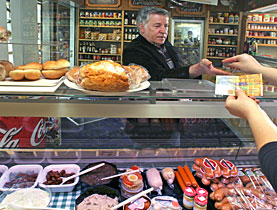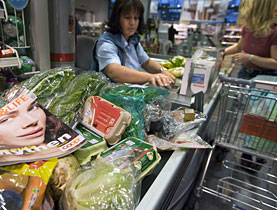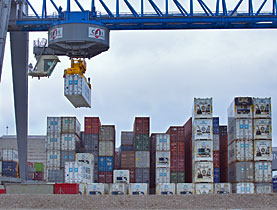Swiss consumers “should not fear inflation”

Switzerland should escape the worst effects of a worldwide rise in prices thanks to the strong franc and wage discipline, economists believe.
Inflation rates soared to a 15-year high of 2.6 per cent in March, but were much lower than in the Euro-zone and the United States. BAK Basel Economics is the latest economic research group to predict a downward correction.
BAK forecast on Wednesday that falling oil prices would kick in during the second half of the year to bring the annual inflation rate down to 1.7 per cent for 2008.
This is good news for Swiss consumers who are quite used to paying higher prices for goods than neighbouring countries.
A separate report by Credit Suisse bank adds that the gap between Swiss and European food prices is slowly falling, partly thanks to increased competition in the grocery market from German discount retailers.
Added to that, the global hike in raw materials for the food industry has inflated European prices more than in Switzerland, where the agricultural market is largely sealed off from the outside world by a system of tariffs.
So why is the current global inflationary scourge less of a problem in Switzerland than in most other parts of the world?
Franc strength
Part of the reason can be traced to the traditional wage policies and to the policy of the Swiss National Bank (SNB), according to Bank Sarasin economist Alessandro Bee.
“The SNB has a better record than the US Federal Reserve because it targets inflation rather than putting the emphasis on economic growth. The SNB has never tried to re-inflate the economy to boost the business cycle,” he told swissinfo.
“Wage growth in Switzerland has also been traditionally lower than in the US and Euroland, putting the brakes on consumer spending.”
A more recent development has been the appreciation of the Swiss franc against the dollar, bringing down the price of imports from the US.
All of these factors, along with the insulation of Swiss agricultural market from inflation, has given Switzerland the edge according to Credit Suisse chief economist Alois Bischofberger.
“As long as inflationary rises are mainly due to higher energy prices I do not expect any second round effects in Switzerland, such as higher inflation in consumer goods and wages,” he told swissinfo.
Short term boost
A continued inflation rate of 2.6 per cent would over time dampen household consumer spending, he added. But Bischofberger also expects inflation to drop to around 1.5 per cent for the year as a whole.
For the moment, it appears that Swiss consumers are not paying quite so much more for some goods as they usually do compared with neighbouring countries. But Switzerland remains an island of high prices in the middle of Europe.
And the only sustainable way to bring prices down would be to drop tariffs and adopt European Union free trade measures, economists agree.
swissinfo, Matthew Allen
Economic research group BAK Basel Economics predicted on Wednesday that inflation would hit 1.7 per cent in 2008, followed by 1.3 per cent in 2009.
But it trimmed its 2008 GDP growth forecast down from 2.3% to 2.1% for 2008 and from 2.1% to 2% in 2009.
The reason trimming its predictions, last made in December, is the greater uncertainty in the world economy as a result of the worsening US subprime mortgage crisis.
Unemployment should drop from 2.8% in 2007 to 2.4% this year and next.
The Swiss economy grew 3.1% in 2007, according to the State Secretariat for Economic Affairs.
The Swiss franc has strengthened dramatically against the US dollar in recent months. Earlier this year the franc was worth marginally more than the dollar, but both currencies now carry about the same value.
The Swiss National Bank left its key interest rate unaltered at 2.75% the last time it met in March.

In compliance with the JTI standards
More: SWI swissinfo.ch certified by the Journalism Trust Initiative



You can find an overview of ongoing debates with our journalists here. Please join us!
If you want to start a conversation about a topic raised in this article or want to report factual errors, email us at english@swissinfo.ch.